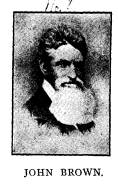Ohio History Journal
|
Comments, Notes and Reviews. 375
Mr. Sherman was one of the first members of the Ohio State Archaeo- logical and Historical Society, and for some years took a personal in- terest in its proceedings. For ten years past, and at the time of his death, he was one of the trustees.
JOHN BROWN-A REVIEW. In American history there are few, if any characters, the story of whose life is so erratic, dramatic or so tragic, as that of John Brown. As |
|
|
he spent his youth and many years of his manhood as a resident of Ohio (see account of the Hudson Centennial in the previous pages of this Quarterly) he is a proper subject for our consideration. His life has recently been written and published by William Elsey Connelley, a life member of the Ohio Archaeological and Historical Society, the author of several valuable historical works, now a resi- dent of Topeka, Kansas, where he improved un- usual facilities for obtaining accurate knowledge concerning the career of John Brown in that state. Indeed, the work of Mr. Connelley deals mostly with the Kansas portion of Brown's efforts in behalf of freedom for the slaves. The author rather slight- |
|
ingly passes over the youth and formative period of John Brown, but does ampler justice to the latter part of his life. John Brown was the direct de- scendant of Peter Brown, an English Puritan, and one of the Pilgrim fathers, in the Mayflower, who landed on Plymouth Rock, December 22, 1620. Owen Brown, father of the famous John, was a Revolu- tionary hero, a tanner and a shoemaker, and lived at Torrington, Con- necticut, where John was born, May 9, 1800. In the year 1805 the family moved to Hudson, Ohio. Owen Brown was an ardent aboli- tionist, and religiously encouraged similar sentiments in the minds of his children. John was taught from earliest childhood to "fear God and keep his commandments." He received no more education than fell to the lot of the average boy on the pioneer man's frontier, where schools were few and necessarily inferior. He had an exceptionally studious and reflective disposition. He read such books as came within his reach. They were mainly "AEsop's Fables," "Life of Franklin," "Pilgrim's Pro- gress," "Plutarch Lives," "Life of Oliver Cromwell," "Baxter's Saint's Rest," Dr. Watts' Hymns, and above all and constantly the Bible. He learned little at school but something of mathematics and the principles of surveying. He never became much of a scholar. Thoreau has quaintly said of him, "He did not go to Harvard. He was not fed on the pap that is there furnished. As he phrased it, 'I know no more grammar than one of your calves,' but he went to the University of the West, |
